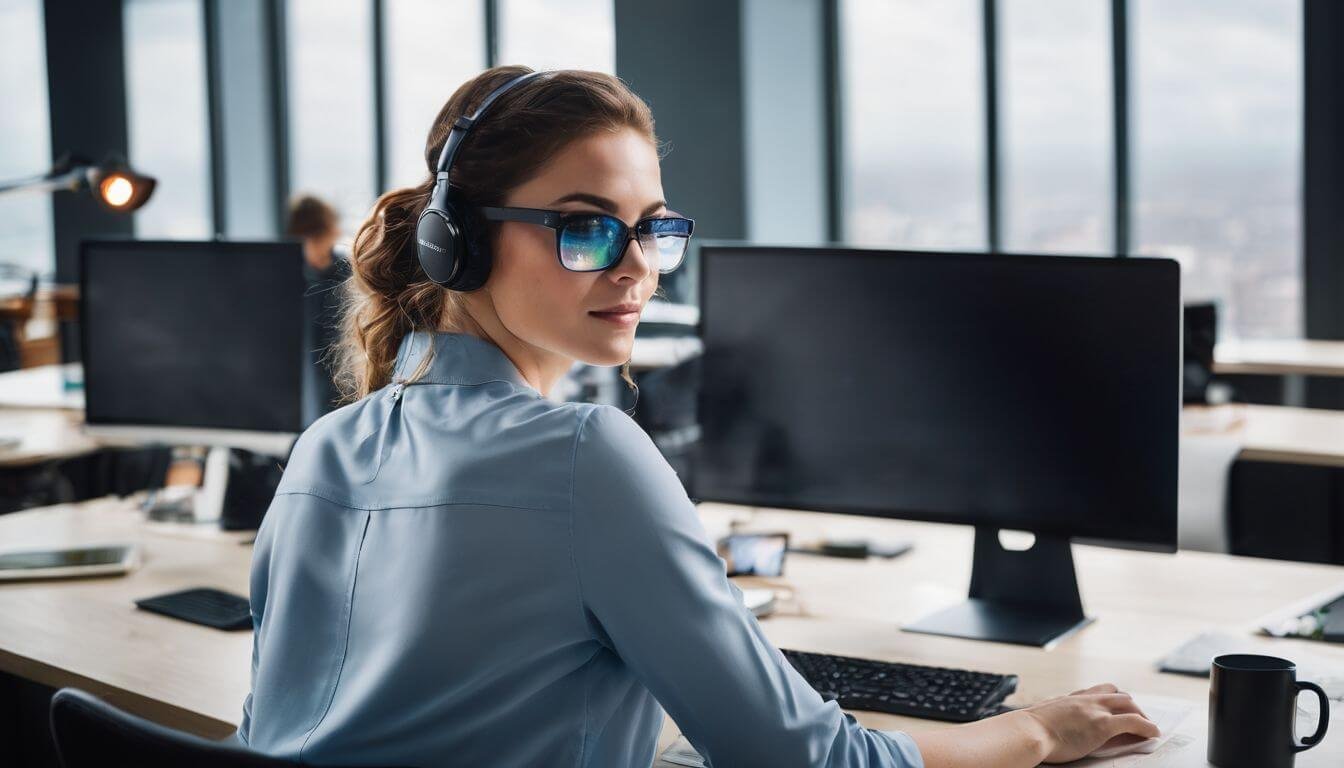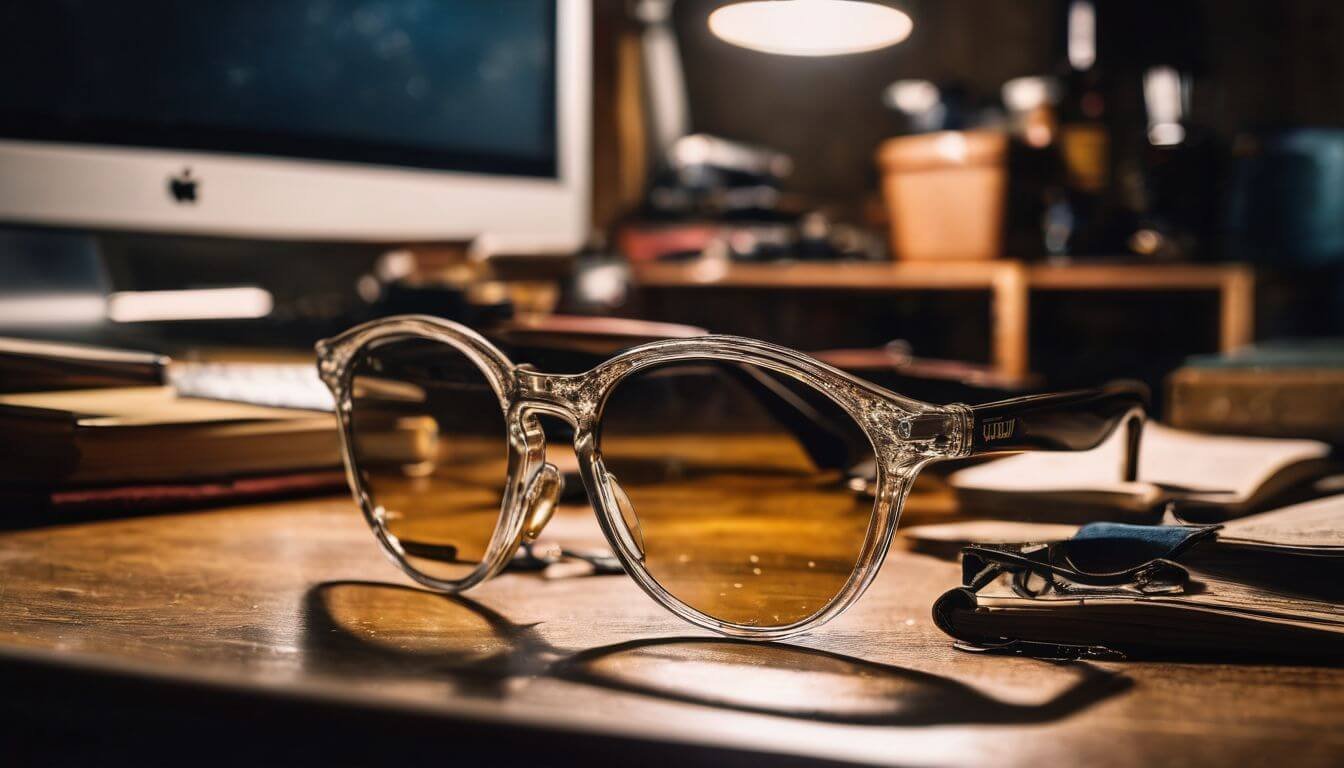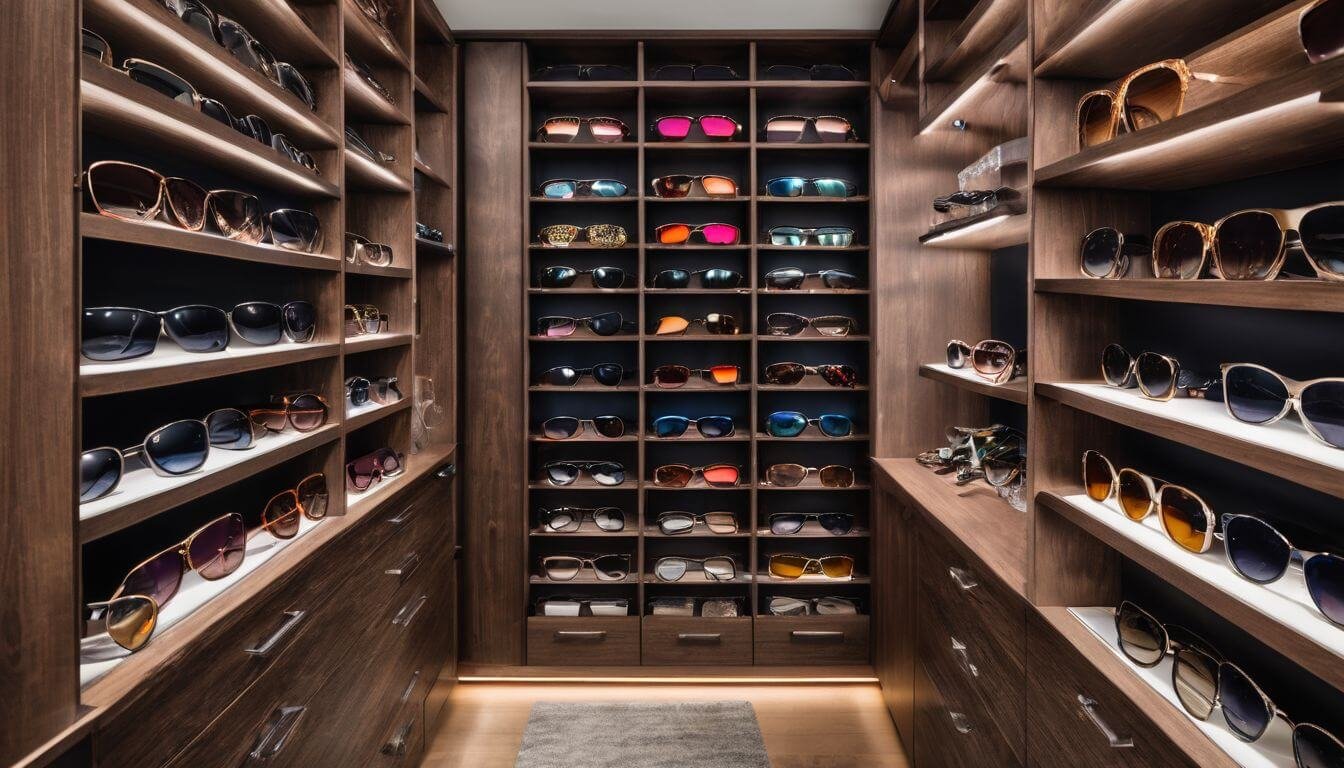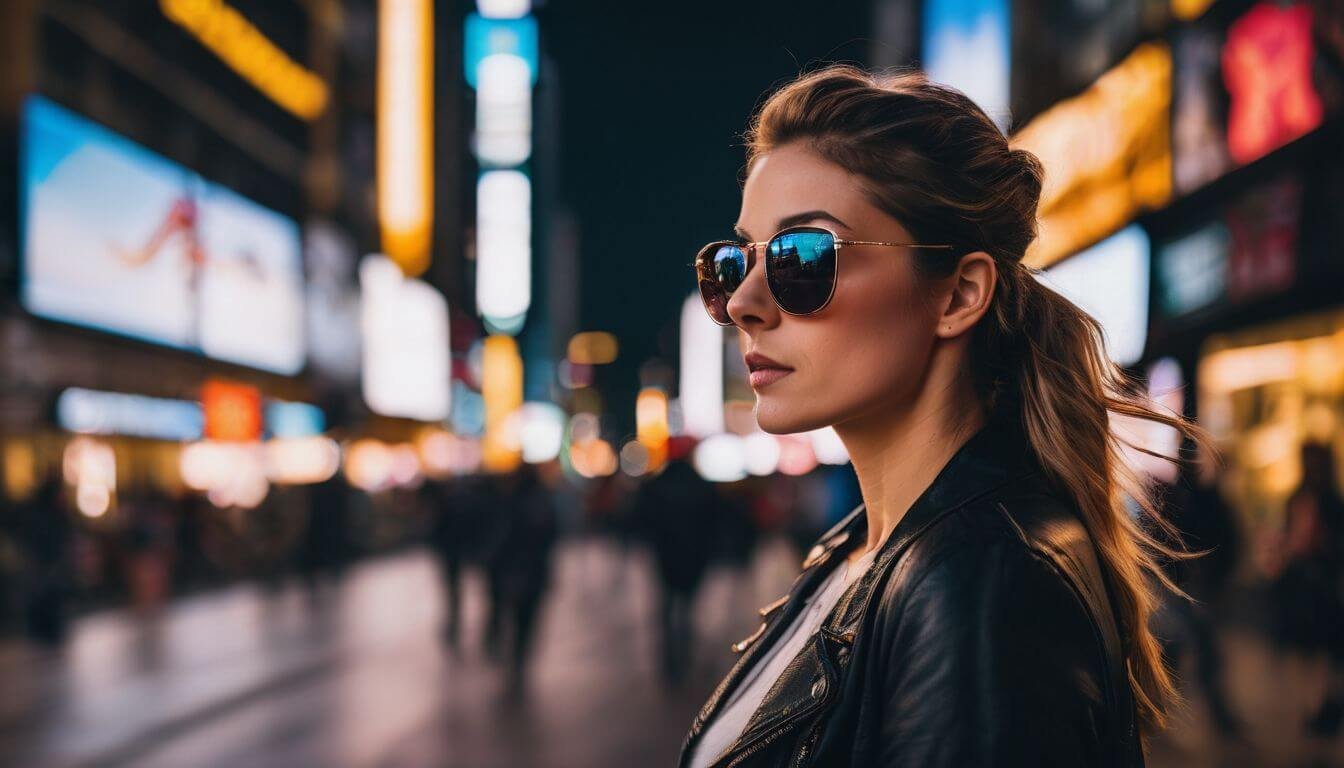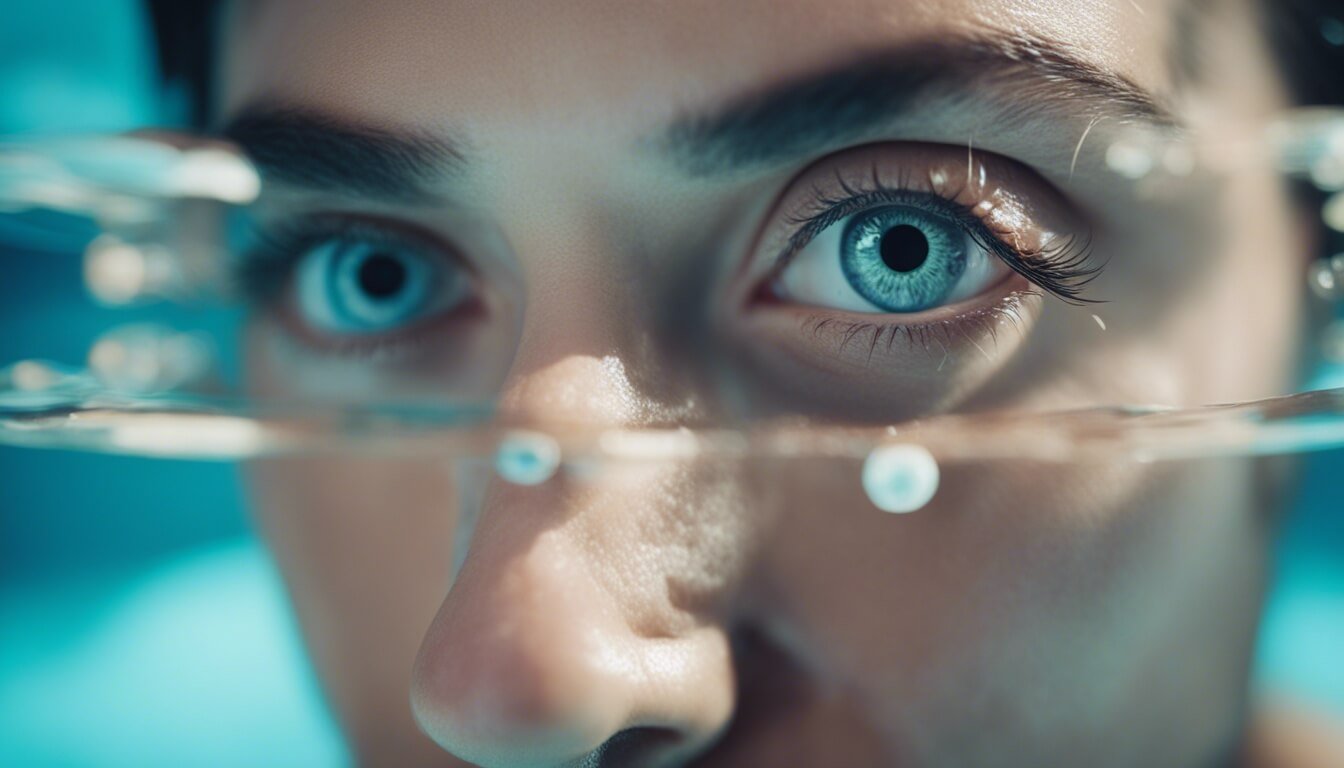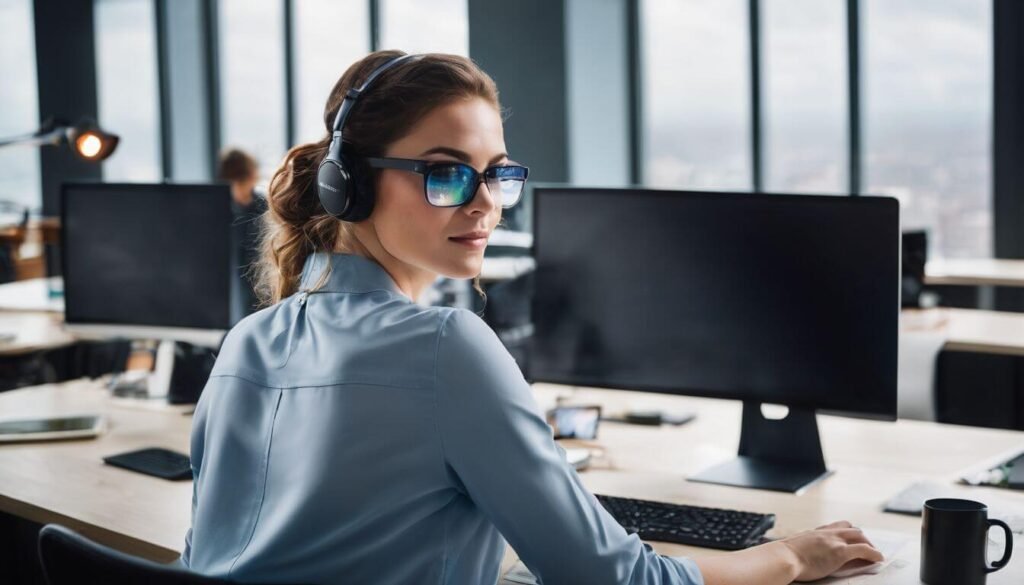
Do Blue Light Glasses Really Work?
Staring at screens all day, your eyes might be crying out for a break. Ever heard of blue light glasses? They promise to shield our peepers from the glare of our many gadgets. Dive into this article; we’ll unpack whether these trendy specs are friends or just fashion.
Keep reading—your eyes might thank you!
Key Takeaways
- Blue light glasses have coatings that block some blue light from screens and lights.
- Some studies say blue light glasses can help you sleep better by blocking light that stops melatonin, which is the chemical that makes you sleepy. However, not all research agrees they help with eye strain.
- To protect your eyes, try to look away from screens every 20 minutes for at least 20 seconds and sit about an arm’s length away.
- Not just glasses—changing screen settings to warmer colors or using apps can reduce blue light too.
- Taking breaks, using artificial tears, and setting up proper lighting are also good ways to keep your eyes healthy when looking at screens.
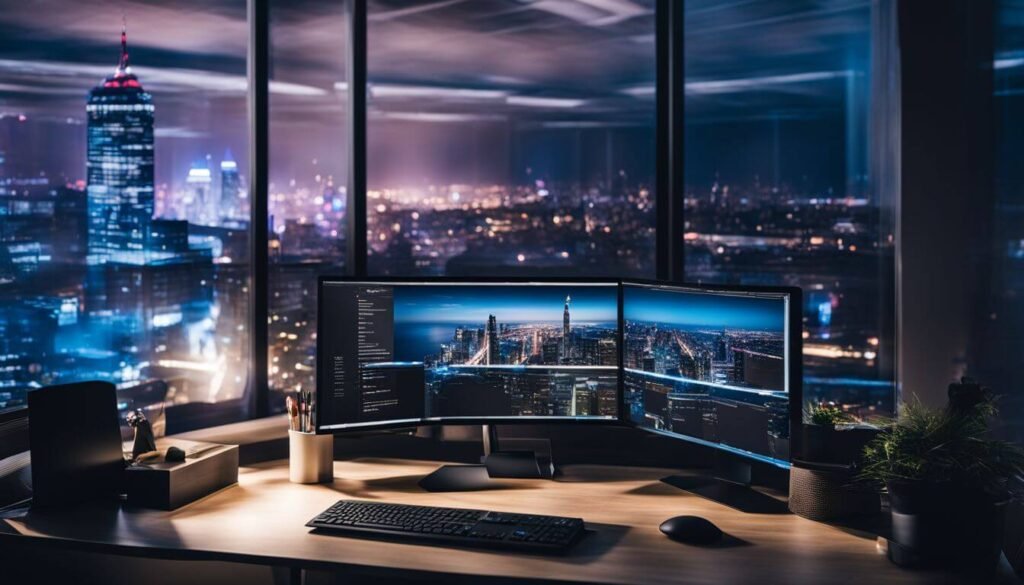
What is Blue Light and How Does It Affect Us?
Have you ever wondered about that eerie blue glow from our screens? Yeah, it’s called blue light—and it turns out, this sneaky little wavelength may be more than just a pretty color.
It might be messing with our sleep and making our eyes beg for mercy (ouch!). Stick around as we dive into the science of how this vivid hue is influencing us, in ways we’re only starting to get.
Blue light and sleep
Blue light can mess with your sleep. That’s because it tells your body it’s daytime, not bedtime. When you stare at screens before you hit the hay, your brain gets confused and stops making melatonin.
That’s the stuff that helps you drift off to dreamland. Wearing blue light glasses might be a good idea if scrolling through your phone is part of your night routine. They’re supposed to shield your eyes from those wake-you-up waves.
Now, imagine finally getting some shut-eye without tossing and turning! Some folks who have trouble sleeping say these magical lenses help them catch more Z’s. Science backs this up too – studies found that people with insomnia could get better sleep when they wear blue light-blocking glasses before bed.
So grab a pair, make yourself comfy, and give “Goodnight” back its meaning!

Blue light and eye strain
Staring at screens all day is tough on your eyes. They have to deal with blue light, and too much of it can make them tired. Think about how you feel after hours glued to your computer or phone—your eyes might get dry or sore.
This is called digital eye strain, and yep, it’s a real thing.
Now, some folks say that wearing glasses that block blue light helps keep their eyes feeling good. These special lenses might cut down on the amount of blue light reaching your eyeballs.
That could mean less squinting and fewer headaches if you’re stuck on screen time for long stretches. But don’t toss out those regular specs just yet! Scientists are still trying to figure out if these blue-light busters really do the trick in keeping our peepers perky.
Sources of blue light
Blue light is everywhere, and we get it from many places. Our eyes are hit with blue light all day long.
- The sun: Good old sunshine is a major source of blue light. When we’re outside, we soak up lots of it.
- Digital screens: Think computers, tablets, and smartphones. They beam blue light right into our eyes.
- LED lights: These bright bulbs are great for energy saving, but yep, they give off blue light too.
- Fluorescent lights: Like the ones in schools or offices. They’re another big source.
- TVs: Not just the old school types but also the new flat screens add to our blue light exposure.
- E-readers: Love your Kindle or tablet for reading? It’s shining blue light at you as well.
- Gaming consoles: While playing video games, those colorful screens are also sources of blue light.
- Certain toys: Some modern toys have screens or lights that can emit blue light.
The Effectiveness of Blue Light Glasses
So — do these trendy specs stand a chance against the mighty glow of our screens? Well, let’s dive into the nitty-gritty of whether blue light glasses are more than just a fashion statement.
There’s quite the buzz around them, and you’ve probably heard claims that they’re like superhero capes for your eyeballs.. but are we talking legit science here, or is it just all smoke and mirrors? Let’s peek behind the lens!
Mixed reviews and ongoing research
People talk a lot about whether blue light glasses work. Scientists are still looking into it. Some studies show these glasses don’t help much with eye strain from screens. But other research says they might be good for folks who find sleeping hard after using their phones or computers late at night.
Now, think about this: wearing blue light glasses all day every day may not do much for you. Experts say just put them on when you really need them, like if you’re binge-watching your favorite show until late in the evening or working on that big report well past bedtime.
It’s kind of like having an umbrella – you wouldn’t carry it around when there’s no rain in the forecast, right?

The Science Behind Blue Light Glasses
Blue light glasses are like superheroes for our eyes—they have a special shield that fights off the blue light from screens. This kind of light can make it hard to sleep and may lead to tired eyes after staring at a computer or phone for too long.
The lenses in these glasses block some of the blue rays, which might help stop eye strain and keep our body clocks on time.
Scientists have been working out whether wearing these glasses really makes a difference. They’ve found that folks with trouble sleeping could get better rest using them before bedtime.
But when it comes to easing sore eyes from looking at screens, studies aren’t so sure they help much. So, while they’re not magic wands that fix every eye problem, they could give you a hand if blinking lights keep you awake at night.
Effects on sleep quality
Having trouble catching some Z’s? Your screen time before bed might be the culprit. Blue light tells your body it’s not time to sleep yet by messing with melatonin, that sleepy hormone we all need.
Popping on a pair of blue light glasses could keep that sneaky blue light from tricking your brain. Think of them like a cozy blanket for your eyes at night.
Now, let’s talk science: studies show folks with insomnia might get more shuteye with these specs on. That said, they’re not magic lenses for everyone – but if counting sheep isn’t cutting it, they could be worth a shot.
Just remember to slip them off once you hit the hay; wearing them all the time isn’t going to do any extra favors for those peepers!
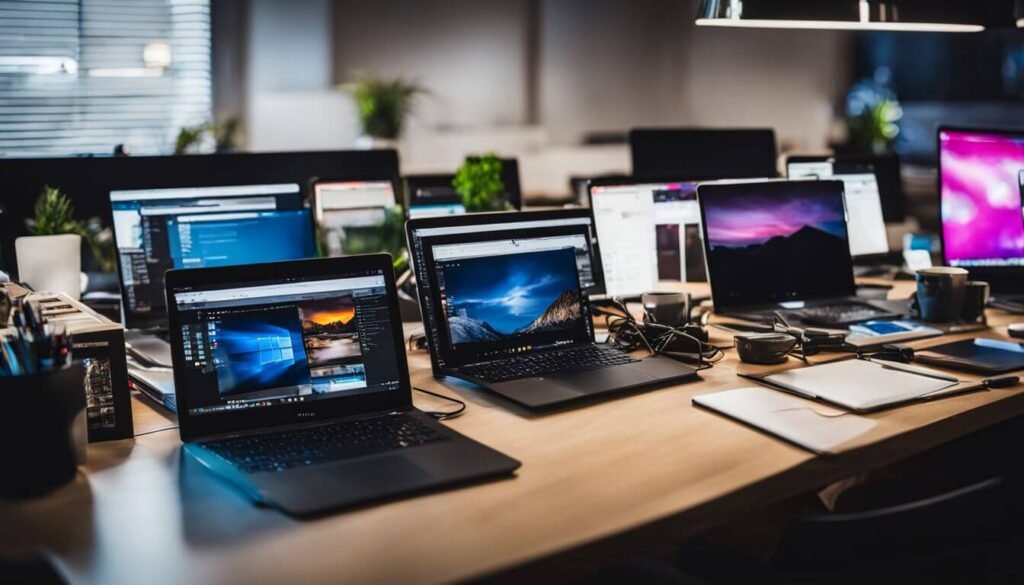
Other Factors Contributing to Digital Eye Strain
Oh, and believe it or not, there’s a whole cast of culprits behind that pesky digital eye strain – it’s not just your screen’s bluish glare throwing the party (keep reading to uncover the mystery gang)!
Improper screen use
Staring at a computer screen the wrong way can hurt your eyes. You may feel tired or have trouble seeing clearly. Here’s what might be going wrong:
- You sit too close or too far from the screen. Your eyes work best when they’re about an arm’s length away.
- The screen is too high or too low, which means your neck and eyes have to work harder.
- Glare from windows or lights can make it tough to see the screen and cause squinting.
- Not taking breaks often makes your eyes tired. Every 20 minutes, look away for a bit to relax your eye muscles.
- Your room might be too dark or too bright compared with your screen. Try to balance the light in the room.
- Bad posture can lead to strain not just on your back but also on your eyes.
- If you forget to blink often, your eyes get dry and sore.
- Sometimes the text size is too small, which makes you lean in and squint.
Poor lighting
Sometimes the light in your room can cause problems for your eyes. Your eyes have to work harder if the room is too dark or too bright. This might make you squint and feel tired. Not enough light, or glare on your screen, can lead to eye strain.
Good lighting helps keep your eyes comfortable.
You should ensure that light doesn’t shine directly into your eyes or your computer screen. Use curtains or blinds if there’s too much sun coming in during the day. A lamp placed just right can give off a warm glow that makes reading easier without hurting your eyes.
So it’s not always about the screens—you’ve got to watch out for those pesky lights around you too!

What Are Blue Light Glasses?
Ever found yourself rubbing your tired eyes after hours of screen time and thought, “There’s got to be a better way!”? Well, folks, meet blue light glasses — these trendy specs claim they’re the knight in shining armor for our digital day-to-day lives..
but do they live up to the hype? Stick around as we dive deep into what these glasses are all about!
How they work
Blue light glasses have a special coating that blocks some of the blue light from screens and indoor lighting. This makes it easier on your eyes. Think of them like sunglasses but for computer work! They shield your peepers from those bright blues that can make you squint and strain.
So, if you’re reading or gaming for a long time, wearing these glasses might help keep your eyes feeling good.
They come in different types with various levels of protection. Some just filter out a bit of blue light; others block almost all of it. Your eyes don’t have to work as hard when they get less blue light.
It’s like giving them a little break while you stare at your phone or laptop screen.
Types of blue light glasses
There are many kinds of blue light glasses you can choose from. These special specs are designed to filter out the harsh parts of blue light.
- Clear lens filters: These look just like regular glasses but have a special coating. They can block a little bit of blue light from screens and indoors.
- Yellow-tinted lenses: They usually block more blue light than clear ones. With a yellow tint, they’re great for gamers or anyone on the computer a lot.
- Orange or red-tinted lenses: Super strong at blocking blue light, these glasses really change how colors look. They might be good for you if you use your screen before sleep.
- Fit-over glasses: If you already wear glasses, these can go right on top. This way, you don’t need to swap out your usual specs to protect your eyes.
- Prescription blue-light-blocking glasses: You can get your normal prescription with the added blue light protection built into the lenses.
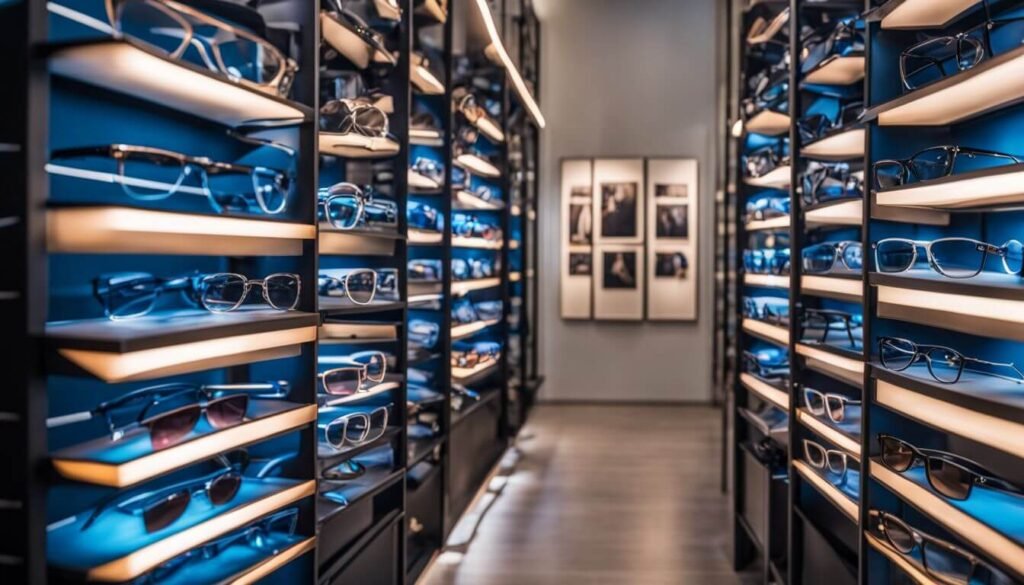
Popular brands
Blue light blocking glasses have quickly become a big deal. People who spend hours on computers or phones are snapping them up.
- Warby Parker: This trendy brand offers blue light filtering as an add-on for their stylish frames.
- Zenni Optical: Known for affordable prices, Zenni has a blue light filter option called Blokz lenses.
- Gunnar Optiks: They’re the trailblazers in computer and gaming glasses and promise high-level protection.
- Felix Gray: Felix Gray glasses boast a clear lens that filters blue light without any tint.
- EyeBuyDirect: With a feature called EBDBlue, this company serves up both fashion and function.
- Spektrum Glasses: Spektrum pushes the tech boundary with options including Pro Blue Light Blocking Lenses.
- Ambr Eyewear: They mix modern frame designs with blue light technology for the style-conscious.
- JINS Screen: These glasses claim to cut 25% of blue light and come in various trendy shapes.

How to Protect Your Eyes From Blue Light
Alright, let’s get real about safeguarding those precious peepers of yours from the wild world of blue light—because who doesn’t want to dodge that digital headache, am I right? It’s not just about throwin’ on a swanky pair of specs; there are some seriously easy hacks to keep your eyes feeling like the cool side of the pillow.
Stay tuned—your eyeballs will thank you!
Take breaks
Okay, let’s talk about giving your eyes a rest. Staring at screens for too long can tire out your eyes. That’s where taking breaks comes in handy—it helps to keep eye strain in check.
Experts say you should look away from your screen every 20 minutes and look at something far off for 20 seconds. It’s like a mini-vacation for your peepers! And hey, why not stand up and stretch while you’re at it? Your body will thank you too.
Get this: there’s even a fancy name for this break—it’s called the 20-20-20 rule. Easy to remember, right? Make it part of your routine to reduce digital eye strain and prevent fatigue.
This won’t cost you a dime but could save your eyes big time! Plus, mixing in some blinks often goes a long way; don’t let those screens keep you from blinking as much as you need to keep dry eye away.
Use artificial tears
If your eyes feel like the Sahara Desert, reach for some artificial tears. These wet wonders can be a big help with eye strain. They moisten your eyes and give them a break from staring at screens all day long.
Just put a few drops in when you need them, and voila! Your eyes will thank you by feeling less tired and scratchy.
Here’s the scoop – using these tear-like drops can offer quick relief. Think of it as giving your eyeballs a little spa treatment amidst the hustle of emails and spreadsheets. Keep a bottle handy, especially when marathon meetings are on the horizon or during those late-night binge-watching sessions where “just one more episode” isn’t really just one!
Sit properly
Sitting the right way can be a big help for your eyes. Make sure you’re at arm’s length from your screen. Your eyes should look slightly down when staring at the middle of it. A comfy chair that supports your back makes a difference too! And, oh boy, don’t forget to blink.
We often blink less when we stare at screens, and that’s no good for keeping our eyes moist.
Got glare on your screen? That can hurt your eyes as well. Adjusting the room lights or using an anti-glare cover could give you some relief. Keep in mind; it’s not just about blue light – all this is part of taking care of those peepers while you bust through another level or finish up a work project!

Alternatives to Blue Light Glasses
7. Alternatives to Blue Light Glasses: But hey, if you’re thinking blue light glasses might be the new snake oil, don’t worry—there’s more than one way to skin this cat. Let’s dive into some other tricks and tweaks that could save your peepers from the dreaded screen glare without having to sport those trendy specs.
Lifestyle Changes and Screen Habits
Blue light from screens can make it hard to sleep and cause eye strain. Cool fact – there’s a link between blue light and how we feel at night!
- Switch off electronics long before bedtime – Hey, this may boost your zzz’s! Your body makes a snooze chemical called melatonin, and less blue light means more of it.
- Adjust screen settings – Most devices have a night mode; use it to dial down the blue.
- Keep screens at arm’s length – Not too close now! This helps cut the glare.
- Blink more often – Sounds funny, right? But it keeps your eyes from feeling like the desert.
- Use dimmer switches on lights at home – Make things cozier and give your eyes a break with softer lighting.
- Follow the 20-20-20 rule – Every 20 minutes, look 20 feet away for 20 seconds. Bet you’ll spot something new!
- Manage screen time for kids too – Grown-ups aren’t the only ones who need breaks. Kids should jump around and play more than they tap on screens.
- Choose screens wisely – Go for bigger text and turn up that contrast to see better without squinting.
- Get regular eye exams – The eye doc can check if you need glasses or adjust what you have now.
- Keep your device clean – Wipe those smudges off! A clear screen is easier on the eyes.
Software Solutions and Screen Filters
So you’re looking at your screen and thinking about how to keep those eyes happy. Good news! Some tech tricks can cut down on blue light without having to pop on a pair of glasses.
- Your phone or computer might have a built-in “night mode.” Turn this on, and it changes the colors of your screen to warmer tones with less blue light.
- Apps galore! You can download apps that adjust your screen’s blue light. Examples include Flux for computers or Twilight for Android devices.
- Many screens come with settings letting you tweak the color temperature. Make it warmer to dial down the blue light.
- Pop on a physical filter – these are like super thin sheets you lay over your screen to block out some blue.
- Some monitors have a button right there. Press it, and ‘voilà,’ less blue light!
- Oh, and don’t forget gaming glasses. They’re tinted yellow or amber to cut back on the blue while you play or work.
- If you’re working long hours, look into software that reminds you to take breaks. Your eyes will thank you!
- Got two monitors? Set one up for work with less blue light, and keep the other regular for when you need bright colors.
- A tip from the pros: Adjust your device’s color range — this lets you get just the right amount of blue out of there.
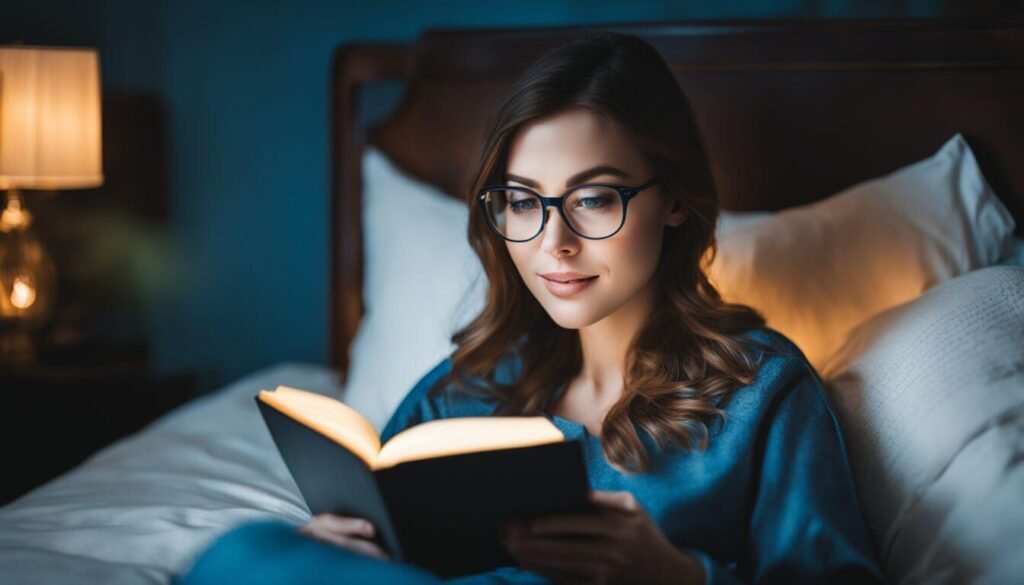
Conclusion: Do Blue Light Glasses Work?
So, we’ve navigated the twisty maze of blue light and our trusty companions, the blue light glasses. But do they really live up to the hype? It’s a bit like that cliffhanger at the end of your favorite show — some swear by these specs while others just shrug.
Sure enough, science hasn’t handed us a crystal-clear verdict yet. So if you’re thinking about giving them a whirl, remember: it’s less about donning magical lenses and more about tuning into what feels right for those peepers of yours.
Limited evidence but potential benefits
Some folks say blue light glasses are a must-have to keep your peepers happy. But hold up, the science isn’t all in yet. Sure, these nifty specs claim to cut down on the harsh blue light from screens that can mess with our zzz’s and make our eyes feel like they’ve run a marathon.
A bunch of smart researchers think they might even help people who toss and turn all night.
But here’s the twist: even though some studies shout “yes” to better sleep and less squint-related headaches with blue-light blockers, others give a big “nope” when it comes to easing eye trouble from too much screen time.
It’s not black and white – there’s no big fat stamp of approval saying these glasses will for sure cure all your digital woes. Yet, don’t toss them out just yet! They could still be worth a shot if you’re glued to gadgets after dark or trying to snag some solid shut-eye.
Importance of proper eye care amidst increasing screen time
Taking care of our eyes is super important, especially with how much we stare at screens. The glow from computers and phones is not the best for our peepers. It can mess with sleep and make eyes tired.
For real, too much screen time without a break or some help leads to digital eye strain. That’s why eye doctors tell us to follow good habits every day.
Many hours in front of screens can hurt your eyes over time. Blue light glasses might be handy here; they aim to block out the blue that tires out eyes after long use. But hey, it’s not just about glasses! Giving your eyes frequent breaks helps a ton, and so does blinking more often (it keeps your eyes from drying out).
So keep these tips in mind when you’re catching up on emails or binge-watching shows—it’s all about keeping those baby blues (or browns or greens) healthy!

FAQ
Q: Do blue light glasses really work?
A: Blue light glasses are designed to filter out blue light, particularly from digital devices. There is some evidence that blue light can affect eye health, causing symptoms of digital eye strain such as eye fatigue and light sensitivity. While the American Academy of Ophthalmology does not yet fully endorse their use due to needing more extensive research, many users report a reduction in eye strain and improved sleep patterns. Thus, although the effectiveness can vary from person to person, many find that blue-light glasses help with eye strain.
Q: How do glasses help with eye strain?
A: Glasses designed to reduce eye strain typically have lenses that filter out blue light and may also have a slight magnification to ease the workload on your eyes. By filtering out blue light, they can reduce the amount of blue light exposure, which is thought to help reduce symptoms of digital eye strain, including tired eyes and difficulty focusing.
Q: Is blue light harmful?
A: Exposure to blue light in itself is not necessarily harmful; in fact, blue light during daylight hours is beneficial for health, improving alertness and mood. However, excessive exposure to blue light, especially from screens before bedtime, can disrupt your circadian rhythm and affect sleep quality. There is ongoing research into the extent to blue light causes eye symptoms, but limiting exposure, especially during the evening, is generally considered beneficial for health.
Q: Can blue light blocking glasses improve eye health?
A: Blue light blocking glasses can potentially contribute to better eye health by reducing exposure to blue light, which may in turn help to lessen eye fatigue and other symptoms of digital eye strain. While they are not a cure-all solution, they are a preventative measure that can be part of a healthier lifestyle for your eyes, including taking regular breaks from screens and ensuring good lighting when using digital devices.
Q: Are all blue light blocking glasses the same?
A: No, there is a wide variety of blue-light glasses available, varying in the amount of blue light they filter out. Some glasses are designed for use during the day to reduce eye strain, while others are intended for use before bedtime to improve sleep quality. It’s important to select glasses based on when and how you plan to use them, and consider recommendations from reputable sources or optometric professionals.
Q: How can I get blue light glasses that suit my needs?
A: To get blue light glasses that best suit your needs, consider how much time you spend in front of digital devices and when you experience the most eye strain or sleep disruption. Reading product reviews, consulting with an eye care professional, and looking for glasses that specify the percentage of blue light they filter can help you make an informed decision.
Q: How can I reduce digital eye strain without glasses?
A: Reducing digital eye strain without glasses involves taking regular breaks using the 20-20-20 rule (every 20 minutes, look at something 20 feet away for at least 20 seconds), adjusting your computer screen settings to reduce glare and blue light emission, ensuring proper lighting in your workspace, and increasing the text size on your devices for easier reading.
Q: Can wearing blue light glasses all day be harmful?
A: There is currently no evidence to suggest that wearing blue light glasses all day is harmful. In fact, for individuals experiencing eye fatigue or those who spend a significant amount of time in front of digital devices, wearing them may help reduce eye strain and improve comfort. However, it’s essential to ensure your glasses fit well and to consider incorporating other healthy eye habits into your routine.


